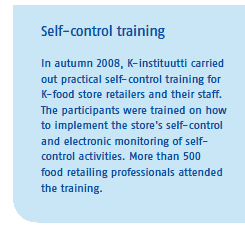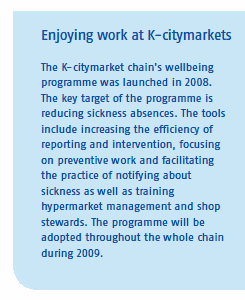At the end of 2008, the total number of
Kesko personnel was 24,668 in eight different
countries. Of these, 13,651 worked
in Finland and 11,017 in other countries.
The average number of personnel converted
into full-time employees was
21,327. The average decrease in Finland
was 95 employees, while in other countries
the average increase was 902
employees.
Kesko's most international division
is Rautakesko, with 96.5% of its 10,158
employees working outside Finland.
In all, Kesko and its chains' retailer
entrepreneurs employ some 50,000
people.
Kesko's strengths include providing an
opportunity for versatile internal job
rotation and for career development.
During 2008, some 2,000 people moved
to new jobs within the Kesko Group.
In 2008, one of the major focuses in HR
management was distributing the new
guide, “Our Responsible Working Principles”,
to all employees in every country
in which Kesko operates. The introduction
to responsibility was supported,
among other things, by an
Kesko was highly rated in Universum,
the Finnish employer profile survey, in
2008. Among commercial students, Kesko's
ranking in the list of ideal employers
improved. The ranking among young
professionals with a university degree has
risen from 28th to 13th in the space of
two years, while those with an initial
vocational education in commercial studies
ranked Kesko 6th.
Kesko carries out close cooperation
with students and teachers in different
sectors. For example, the job-orientation
of Finnish teachers of commercial and
technical subjects is promoted in trainings
arranged by Kesko.
The most competent and motivated people in the trading sector
Kesko and its chain stores also offer their
employees good opportunities to develop
their competencies in a target-oriented
manner.
In Finland, Kesko's subsidiary K-instituutti
is the K-Group's competence development
centre. The business model of
K-instituutti was revised in 2008. It plans
competence development solutions for
chain business needs and carries out
training programmes together with its
partner network. The provision of
regional training is also increasing. In
2008, the training programmes implemented
by
The 2008 Master Sales Assistant training,
Finland's largest adult training programme,
had over 16,000 participants in
13 different product lines.
The Rautia chain was named the Master
Sales Assistants' trainer chain; 80%
of all Rautia chain store employees completed
the Master Sales Assistant training.
About one hundred business colleges and
polytechnics also offered their students
an opportunity to participate in the
training, and some 6,000 students took
this opportunity.
Kesko's second K-trainee programme
ended in January 2009. Those who completed
the first K-trainee training and
recruitment programme were hired for
managerial and specialist duties by different
companies in the Group during
2008. The car salesmen who completed
VV-Auto's car salesman trainee programme
were recruited to jobs corresponding
to their training.
Management and leadership
 At Kesko, management is conducted in a
responsible manner and in compliance
with the corporate values. A developing
and motivating working community is a
prerequisite for the wellbeing and excellent
performance of employees.
At Kesko, management is conducted in a
responsible manner and in compliance
with the corporate values. A developing
and motivating working community is a
prerequisite for the wellbeing and excellent
performance of employees.
The annual personnel survey plays a
key role in measuring the quality of
management and the internal employer
profile at Kesko. The similar survey,
revised in 2008, is conducted throughout
Kesko and its chain stores. The revised
survey provides even more concrete
information about the strengths and
development targets of working communities.
Replies were received from 68.8%
of the employees of the companies
included in the survey.
One of the key tools in efficient performance
management and the motivating
leadership of immediate superiors is
the annual performance and development
review whose implementation is
included in the annual personnel survey.
Furthermore, the performance of the
entire Group's key personnel is assessed
separately.
Leadership skills and career progress
are supported by Kesko's own three-step
superior and management training, the
internationalisation of which is under
development.
Since 2004, Kesko has implemented a
long-term development programme for
members of the management and potential
management. There are some 200
participants in the programme, whose
purpose is to ensure a sufficient supply
of managerial resources both in terms
of quality and quantity. This is complemented
by the chains' own training,
such as the “K2-tusen chef” programme
by K-rauta AB in Sweden, which combines
theory and practice for the needs
of future management. The third programme
will be launched in 2009.
Kesko's first own K-retail eMBA programme,
implemented in cooperation
with the Helsinki University of Technology,
concluded in January 2009. The programme
aims to strengthen the participants'
abilities to act in international
retail management duties.
Towards the best work productivity in the trading sector
 The key objective of the ongoing work
and productivity programme is to
improve the employees' work productivity,
for example by focusing on the competence
and wellbeing of people and on
better leadership. The programme also
involves measures related to increasing
operational efficiency and electronic
communications. The work and productivity
programme applies to all of Kesko
and its chain stores.
The key objective of the ongoing work
and productivity programme is to
improve the employees' work productivity,
for example by focusing on the competence
and wellbeing of people and on
better leadership. The programme also
involves measures related to increasing
operational efficiency and electronic
communications. The work and productivity
programme applies to all of Kesko
and its chain stores.
Long-term projects focusing on wellbeing
at the workplace are currently
underway in several companies. The aim
is to increase work productivity by reducing
sickness absences and raising the
retirement age. The monitoring of sickness
absences will be defined and management's
intervention skills will be
improved. Improvements to work productivity
are also sought by promoting
the adoption of different working hour
models and by systematic working hours'
management.
In Finland, Kesko's Occupational Health
Service Unit focuses on operations that
maintain work capacity and promote the
wellbeing of the working community.
Currently 35–45% of the aggregate costs
of occupational health are allocated to
these activities. In other countries, occupational
health services have been
arranged according to the local practice
and legislation. Support for personnel's
recreational activities is provided through
joint staff clubs and in the form of company-
specific contribution.
Most of Kesko's employees belong to
a bonus incentive system. The management's
incentive systems are described
on page 62.
Kesko's internal communications will
become more international and efficient
with the completion of the new intranet
that is currently under construction.
Information about HR affairs is also
available in the Corporate Responsibility
Report, to be published in spring 2009.
